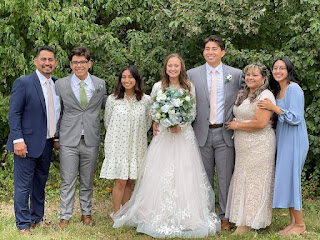Dating: RAM & "Know Quo"
If we were to compare dating now to the old ages, it would be fair to say that it is entirely different. We could even say that we wouldn’t necessarily need to go back 200 years. I would say that the dating culture now is much different than what is was 10 years ago.
In our class discussion, I we talked about the dating
culture in our school. Everyone thought differently, but I thought that it
sucked! It was quite saddening to realize that what we call “dating” now
actually means hanging out without and sort of commitment. Our professor also mentioned
something that resonates with me. He said, “If you fall in love, you can fall
out of it too” and I could not agree with him more. On the board there were 4
steps: dating, courtship, engagement, and marriage. We were taught that we
should work towards building and nurturing a relationship from the bottom
instead of jumping straight to marriage without even getting to know the other
person. It was here that we were introduced to the RAM (Relationship Attachment
Model). The model is thanks to the book, “How to avoid falling in love with a
Jerk” by John Van Epp.
Another important piece of information is called the “Know
Quo” (“Knowing” Quotient) also in the book by John Van Epp. It looks like the
following:
Togetherness (Sharing experiences)
Talk (mutual self-disclosure)
+ Time (3 months to begin to
know)
______________________________________________
= Knowing another and the couple
Why are these three so important? They lead to a greater
understanding of both individuals involved in the relationship. The first part is
sharing experiences, where it includes going on multiple dates that vary in
activities. It could be going on hikes, board games, picnics, sports, etc. When
the thought in our minds is to get to know people, we will find that out by
going on many different dates to understand more about ourselves and the other
person. We learn about what both like to do, what one may be uncomfortable or even
fearful of. When the goal is to work and nourish the relationship from the
bottom, there is a lot that we can avoid in the future.
The second is to talk to one another. Let’s be honest, how much
can a person learn about another person on a date if they only go to a movie? I
think it would be fair to say nothing. There is not room for talking about one
another and getting to know about each other’s lives. Most importantly, it is
that both are as involved in talking about themselves. That is why it states it
to be as “mutual self-disclosure”. The effort needs to be put forth by both.
The third is time! Of course, there are times where people
may get engaged in a week or a month and then married soon after. There may be times
where they are still together. Although, there also are times where due to not knowing
one another as long, conflict arises in the future which can disrupt the
relationship. Giving each other enough time to think about where the relationship
is at and enough information about the other helps people avoid future problems. This is why I feel that the title “How to avoid falling in love with a Jerk” is a great title.


Comments
Post a Comment